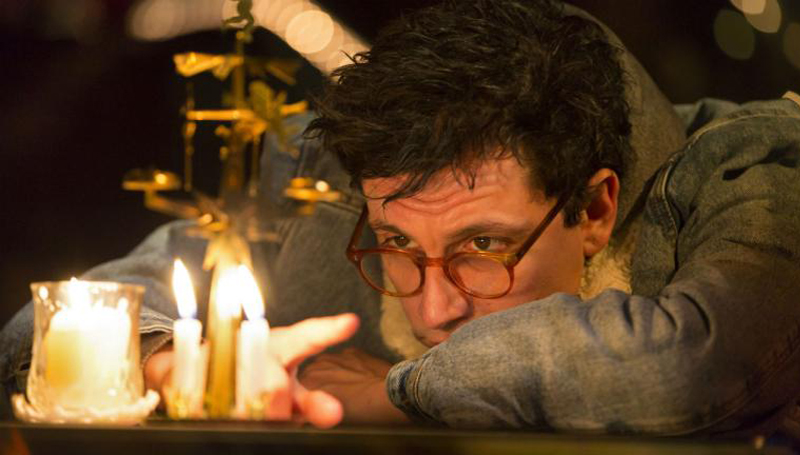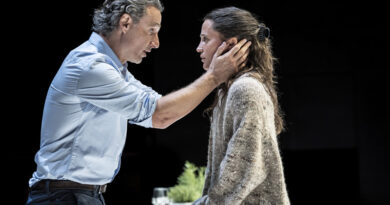“John”, Annie Baker, National Theatre
Jeremy Malies on the South Bank
28 January 2018
Pulitzer Prize-winning Annie Baker has seen her 2015 play John premiered in the UK at The National. With a running time of three and a half hours and two intervals, Baker assumes (as with her previous play Flick which came in at a positively speedy three hours and 15 minutes) that she has a monopoly on your evening. Already a devotee, I went in expectant and was soon seduced.
The action (what little there is) concerns an unlikable 30-something Brooklyn couple in the last throes of a relationship as they return to New York from Ohio after Thanksgiving. The charmless and self-loathing Elias (Tom Mothersdale) is a Civil War buff and since their route takes them through Gettysburg (turning point and bloodiest encounter of the conflict) they stop at a kitsch guesthouse so that Elias can go on tours, some of which claim to conjure up ghosts from the battlefield.

Tom Mothersdale and Anneika Rose.
Photo credit: Stephen Cummiskey.
The fulcrum in every sense is the wonderful Marylouise Burke as Mertis, the guesthouse proprietor. She immediately injects the metatheatrical element that is a hallmark of Baker’s work by laboriously pulling back a heavy velvet curtain to reveal Chloe Lamford’s extraordinary set. Upwards of a thousand eyes stare out at us in the form of dolls, figurines, ceramic angels, cherubs and a glass menagerie. This is a play about seeing and unseeing eyes. Mertis’ blind friend Genevieve (an ethereal June Watson) proves the most perceptive and clairvoyant interpreter of events.
Peter Mumford’s lighting design has the actors illuminate and dim the stage by using lights and lanterns that are an integral part of the set and the action. Mertis reinforces control of proceedings by advancing the time on a grandfather clock. The play draws more attention to its own structure when Genevieve appears through the drapes as we’re filing out for ice cream in the second interval to give us a monologue in which she tells how her husband possessed her to the point of taking her soul and sending Benedictine monks in and out of her head. She addresses the audience directly, inviting us to ensure that she doesn’t exceed five minutes.

Tom Mothersdale and Anneika Rose.
Photo credit: Stephen Cummiskey.
Interesting as the young couple are, it’s Mertis who is the most compelling character whether it’s lyrical imagery as she reads from her nature diary or describing herself as a neoplatonist. A major theme is storytelling; the youngsters create stories for each other and Mertis reads to them from H.P. Lovecraft. The story behind the guesthouse is that it has been used as a dressing station by Unionist forces and became a charnel house. You sense that many of the dead are now restless and Mertis confesses that one of the guest rooms is “temperamental.” The strangeness within the familiar that characterizes both American Gothic and magical realism exudes from the whole set design. Inanimate objects spring to life and a pianola begins playing “Me and My Shadow” after a guest merely touches it.
Loneliness and failed relationships are major themes. Clearly about to ditch him, Elias’ girlfriend Jenny (played by Anneika Rose) describes an experience in which she feels she has had sex with the whole cosmos. June tells her: “I hope your love affair with the universe continues.” The title? There are two characters called John both unseen. The relevance is best kept under wraps. Baker’s latest play, The Antipodes, premiered Off-Broadway last year. It must be a shoo-in for a UK transfer and I’m impatient to see it.









